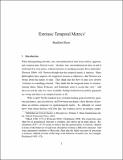Extrinsic Temporal Metrics
Author(s)
Skow, Bradford
DownloadSkow_Extrinsic temporal.pdf (116.9Kb)
OPEN_ACCESS_POLICY
Open Access Policy
Creative Commons Attribution-Noncommercial-Share Alike
Terms of use
Metadata
Show full item recordAbstract
When distinguishing absolute, true, and mathematical time from relative, apparent,
and common time, Newton wrote: “absolute, true, and mathematical time, in and of
itself and of its own nature, without reference to anything external, flows uniformly”
[Newton 2004b: 64]. Newton thought that the temporal metric is intrinsic. Many
philosophers have argued—for empiricist reasons or otherwise—that Newton was
wrong about the nature of time. They think that the flow of time does involve
“reference to something external.” They think that the temporal metric is extrinsic.
Among others, Mach, Poincaré, and Grünbaum seem to accept this view.1 And
these are not the only two views available. Perhaps both Newton and his opponents
are wrong and there is no temporal metric at all.
Who is right? On the standard ways of understanding general relativity, quantum
mechanics, special relativity, and Newtonian mechanics, these theories all postulate
an intrinsic temporal (or spatiotemporal) metric. So, although we cannot
know what future theories will look like, the evidence favors an intrinsic temporal metric. There are dissenters, though; Julian Barbour does not think there is an
intrinsic temporal metric, and has developed alternative physical theories that do
without one.2
Date issued
2010-02Department
Massachusetts Institute of Technology. Department of Linguistics and PhilosophyJournal
Oxford Studies in Metaphysics Volume 5
Publisher
Oxford University Press (OUP)
Citation
Dean Zimmerman editor, Oxford Studies in Metaphysics Volume 5, Oxford University Press, 2010.
Version: Author's final manuscript
ISBN
9780199575794
0199575797